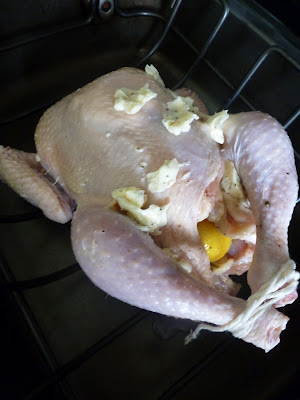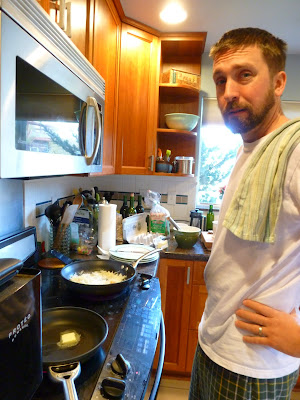The next virtue I wanted to tackle was roasting a whole chicken, but in the end, I managed to knock off at least one other item on the list in the process, and make some steps toward a couple other items on the list. So, let me tell you how things went. Onward!
One of the things that's quickly become apparent about this challenge to myself is that there is actually a fair amount of research involved. While I don't want to make, for example, the perfect roasted chicken, I do want it to be a recipe or style of preparation that seems fairly classic or quintessential. This time out, my research started with my beautiful wife, Sarah. Sarah roasts chickens fairly regularly, and has perfected a quick and easy recipe that gets uniformly excellent results. So, the weekend before I would eventually roast my chicken, I served as her assistant as she walked me through her recipe. Those who know her will agree that Sarah is a natural in the kitchen. If I have any aspirations as a cook, it would be to be able to vaguely emulate the way she effortlessly conducts herself while cooking, and the way she seems to be able to pull together inspired recipes from seemingly thin air.
And, like always, her chicken turned out excellent.

Research!
The day I was to cook my chicken, I dug through a couple of Sarah's recipe books. There was a recipe in one of her Bon Appetite magazines that sounded superb (largely because it involved butter, butter and more butter), but it involved letting the bird sit for something like 8 hours. So, in the end, I turned again to Julia Child and used her recipe for Lemon and Herb Roast Chicken from Julia and Jacques' Cooking At Home.
The bird itself was purchased from our neighborhood butcher, Bob's Quality Meats. I feel fortunate that we live in an area where we have access to a number of dedicated butcher shops, bakeries and produce stands. I have nothing against grocery stores in principle, but there is just something more fulfilling about buying your food at stores dedicated to that specific type of food in question. Plus, the prices and quality are invariably superior in my experience. Also, having gone there consistently for the last three years or so, the people who work at Bob's now recognize us, giving it a neighborhood-ly feel I appreciate.

The bird, from Bob's Quality Meats.
First up was prepping the bird for the oven. To do that, I used a mix of Sarah's method and Julia's. In Julia and Jacques' recipe book, they go into a number of more ornate ways of trussing up a chicken. But, I opted to keep things simple, removing it's "nubbins," folding it's wings back, stuffing it with lemon slices and sage, and simply tying it's legs together. Also, after removing the excess fat from near the cavity hole, I slipped the fat up under it's breast skin, something that Sarah does that seems to get good results and help keep the breast moist. Oh, and I covered it with lots of butter, plus some salt and pepper.

Ready to roast!
Then it was into the oven!
Once it was in the oven, there wasn't much more to do beyond set the timer and check in on it occasionally. After 15 minutes, the temperature get's lowered, and they recommend basting, but really it's on autopilot for the next 45 minutes. Which gave me time to slip in a bonus challenge...
New Virtue Challenge: Mix A Standard Vinaigrette
Sarah suggested it might be nice to have a salad or some veggies with the chicken, and we had all the necessary ingredients, so I figured now was as good a time as any to try my hand at making a vinaigrette. In Julia and Jacques book, they actually have two basic dressing recipes. Julia's is a lemon-oil dressing, while Jacques' is a vinegar and oil bases. So, because I figured my first vinaigrette should contain, y'know, vinegar (and because I was already using all the lemons on the chicken), it was Jacques' recipe I went with.

Chopping shallots for the vinaigrette. In the background you also see the carrots and onions that will be roasted in the pan under the chicken for the deglazing sauce (more on that below). Doing this reminds me that I still need to tackle the first item on Anthony's list, "Chop and Onion/Basic Knife Skills." Obviously, I can technically chop an onion. But, not well. And, my knife skills are underwhelming overall... but I have a plan that I hope to execute soon!
Making a vinaigrette is pretty much as simple as it seems. The main key is using vinegar and oil at a roughly 1/4 cup to 1 cup ratio, and beyond that, it's just a matter of adding other ingredients (garlic, salt, pepper, mustard) to taste. I actually went with slightly more vinegar, because I like vinegar... but it wasn't hard to nail down something tasty, quickly.

Vinaigrette Challenge Complete! This definitely falls into the category of easy to learn... but I'm sure I could try a million variations before I could consider myself a master. I'd also like to try to lemon and oil variation at some point.
With my vinaigrette done, it was back to the chicken.

Chicken done roasting! Now to let it sit for a bit.
When the chicken had been in the oven long enough, I tested to see if it was fully cooked with both a thermometer, and by noting the color of the juices coming out of it. While the chicken rested, I got going on the deglazing sauce. Using the dripping from the chicken, some carrots and onions that had been roasting under the chicken, as well as some shallots, marsala wine, chicken stock and butter; I cooked all the ingredients down in the roasting pan, and then poured it through a strainer to make a smooth sauce to pour over the chicken. This ended up being the surprise hit of everything I did.

Boiling down the deglazing sauce.
After making the deglazing sauce, it was time to carve the bird. I didn't even know where to start, so Sarah carved one half while I watched, and then she stepped back to let me butcher (literally and figuratively) the other half. It wasn't pretty, but I got the job done.
And, how did everything turn out? Take a look!

Bonus!
Also, earlier, I stumbled across this, on the side of a Whole Foods bag. A guide to locale seasonal fruits and vegetables. I still haven't fully figured out how to tackle the "Shop for Fruits and Vegetables and Know What is in Season" item on the list. But, I think that this could prove helpful when I do.

Now, like with my omelet challenge, I don't think that roasting one chicken makes me an expert by any regards. But, I do feel like I have a handle on the fundamentals, and wouldn't hesitate to roast another. And, as a bit of a follow up, the "Omelet Sundays" I institute after my omelet challenge have continued to occur with a semi-regular frequency, so the number of omelet I've flipped now numbers in the dozens. I move slowly closer and closer to omelet mastery.








